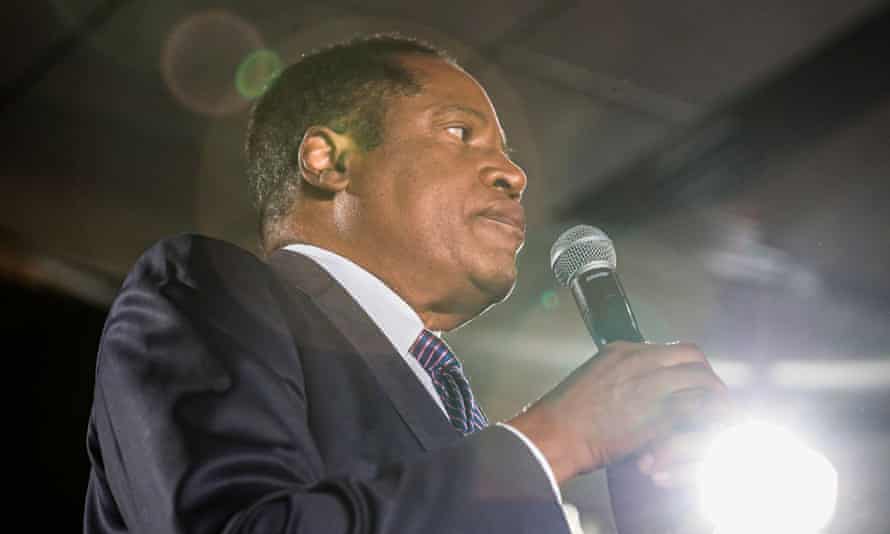It was anger over Gavin Newsom’s pandemic restrictions that ultimately put a recall vote on the ballot. But the California governor doubled down, placing his coronavirus policies at the heart of his campaign and casting his leading opponent – the anti-mask, anti-vaccine rightwing radio host Larry Elder – as a dangerous proxy for Trump.
That winning strategy could have national implications for both Democrats and Republicans already looking ahead to the 2022 midterms.
“Democrats running in other parts of the country next year would do well to study Newsom’s playbook very carefully,” said Dan Schnur, a politics lecturer at several universities. “Newsom was able to take the Covid issue, which might have been a fatal weakness for him, and was able to turn it into a considerable strength.”
The Republican-led recall’s anti-mask, anti-vaccine stance was undercut by the rise of the Delta variant and a surge of infections that overwhelmed hospitals in California and around the US, said James Lance Taylor, a political scientist at the University of San Francisco.
“At least in some states, particularly blue states and some purple states, Newsom’s strategy has offered a model for Democratic candidates,” Taylor added.
That Newsom triumphed over the recall by such a large margin also placed him in an ideal position to run for national office in the years to come, Taylor said. The state saw a huge Covid surge last winter, and Newsom has had to live down major missteps including an initially slow vaccine rollout – but overall, the governor could make a national case that his pandemic leadership saved lives.
The recall has also exposed the potential limits of Trumpian politics in a post-Trump era, says Mindy Romero, founder of the Center for Inclusive Democracy, a non-partisan research organization. A more moderate candidate might have appealed to Democrats willing to try something new, a strategy that helped the Republican Arnold Schwarzenegger prevail over the Democrat Gray Davis in California’s last recall election, in 2003.
“A lot of people voted against the recall because they were fearful of a Larry Elder becoming governor,” she said. “It doesn’t mean they were happy with Newsom.”
Indeed, several voters the Guardian spoke with ahead of the election affirmed fears that California, under Elder’s leadership, could go the way of Florida and Texas. “I’m with a lot of people who might like to recall Gavin, but aren’t necessarily in favor of having Larry Elder in there,” said John Friedrich, a retiree living in Stockton, California, about an hour south of the capital, Sacramento.
Still, that might not weaken the Republican party’s ties to Trumpism. Elder, who didn’t win the governor’s seat, nonetheless captured the greatest proportion of votes amongst Newsom’s challengers, indicating that while he lacked broad appeal, he did energize the state’s vocal, rightwing minority. Elder, who hinted at a 2022 run in his concession speech on Tuesday, has recycled the former president’s “big lie” conspiracy theory that elections lost by Republicans were rigged against them.
“What we’ve learned from the recall is that Republicans aren’t ready for a post-Trump era. They are doubling down on Trump,” said Schnur, who has advised conservative candidates. “If they want to retake congressional majorities next year, that has potential to be a really big problem.”

Still, the peculiarities of California’s recall process, and the state’s unique political structure, do confound attempts to see it as a broad barometer for national politics. Conservatives who opposed Newsom – a broadly popular governor who won office in 2018 by a historic margin – were able to trigger a recall election by gathering just 1.7m signatures in a state with 22 million registered voters. Democrats outnumber Republicans nearly two to one here, meaning any Democratic candidate already has a significant mathematical advantage, regardless of their strategy.
But that the race even appeared close weeks before election day might be a lesson for Democrats in California, and nationally, that they will have to work hard to rally apathetic voters – especially minority voters who have long felt forsaken by their elected leaders.
When polls in August found that distracted and disengaged Democratic voters – especially Latino voters, who make up about 32% of eligible voters – could cost the governor his seat, Newsom’s campaign scrambled. “There was a mad dash to the end to speak to as many Latino voters as possible,” said Christian Arana, a vice-president of the Latino Community Foundation. “But what this election really showed was that outreach to Latino voters needs to happen early, and often.”
Votes are still being tallied in California and neither the final count nor demographic breakdowns are available yet. But according to calculations from Political Data Inc, only about 30% of ballots mailed to Latino voters were returned early, while ballots mailed to white voters had a 50% return rate. Fewer people tend to vote in special elections than in presidential elections or midterms, but in all cases, “turnout in elections is not representative of the population”, said Romero.
“Voters of color have helped make California such a solidly blue state and they were clearly key to Newsom’s victory,” she added. “Now I think Democrats can turn this into an opportunity to get to know the voters better and build a better relationship with voters of color.”


Comments